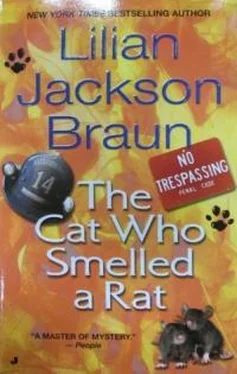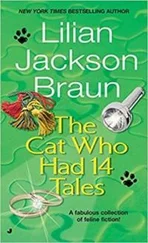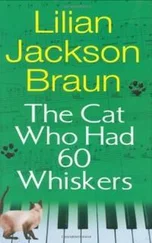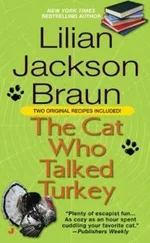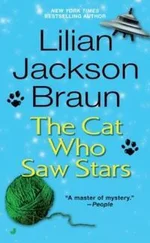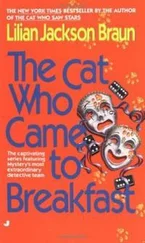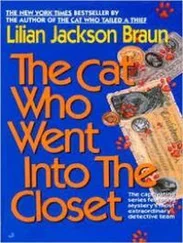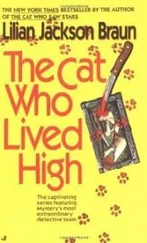In an atrium under a skylight (not the real thing but psychologically effective) patients were lounging in specially designed furniture and indulging in spurts of laughter. Rhoda made the introductions: Chaucer, Pocahontas, Mark Twain, Paul Revere, Joan of Arc … “And this is our beloved Mr. Q!”
The response was instantaneous: “Love your column!” “How’s Koko?” “My daughter won one of your pencils!” “Got your recumbent bike put away in mothballs?”
He replied, “I’m overwhelmed in the presence of so many world-renowned personages. It could only happen in Pickax. Where’s Emily Dickinson?”
“Went home this morning. When she hears you were here, she’ll be fit to be tied!”
“Who was telling bawdy jokes when I came in?” Qwilleran asked.
“We were playing think-games,” Homer said. “We’re making a collection of nostalgic sounds that you never hear anymore-or hardly ever… . Chaucer, do your impersonation of an old car with a weak battery, trying to start on a cold morning.”
“I remember it well,” the man said. “All over the neighborhood you’d hear rrrgh rrrgh rrrgh and then a pause… . rrrgh rrrgh rrrgh rrrgh. The temperature was below zero, and the driver was sweating behind the wheel. Again rrrgh rrrgh rrrgh rrrgh CHUG.! Hopeful silence. Then rrrgh rrrgh rrrgh CHUG CHUG CHUG.’
And the car roared down the street at fifteen miles an hour!”
There were others:
Laundry being scrubbed on a wooden washboard.
An officeful of manual typewriters all clattering at the same time.
A street urchin shouting, “Shoeshines for a nickel!”
The Sunday afternoon sound of cutting grass with a push-and-grunt lawnmower.
A windup gramophone running down in the middle of a record.
Then Rhoda explained that Mr. Q had come to discuss business with Homer, and the three of them retired to the privacy of a hospital room.
Homer said, “We’ve been cudgeling our brains about the Omblower name. Twenty years ago Rhoda was still teaching; I was retired as principal but still poking my nose into everything.”
“Yes, and I remember a Mrs. Omblower,” she said. “It was my year to do parent-liaison, and she was a pathetic little creature-single mother struggling to support herself and her son. She did housecleaning, but it was difficult without a car. And her son got into trouble at school. He was a bright boy-an all-A student-but he had a lawbreaking streak.”
“What laws did he break?” Qwilleran asked. “Thou shalt not do homework for other students… . or sign parents’ names to report cards … or write false absence excuses.”
“Assuming he did it for money,” Qwilleran said, “was he helping out at home?”
“That gives it a hint of nobility,” Homer said, “but he was part of a white-collar crime ring-with two accomplices from affluent families. They were all smart kids who could have used their intelligence for leadership and creative purposes. They were just three bad apples in a barrel of good ones. That happens, you know.”
Qwilleran’s moustache bristled, and he fingered the letter in his pocket. “What measures did the school take?”
“The two students from good families were privately reprimanded and allowed to finish their senior year. Omblower dropped out.”
“It was the kind of thing that the school suppressed,” said Rhoda.
Qwilleran said, “Was his name George? I found a letter he wrote to his mother in Chipmunk twenty years ago. The return address on the envelope looks like that of a state prison.” He read it to them.
Hi, Mom!
Just a note to let you know I’ll be out soon, but if Denise is still around, tell her I’m dead. I’m getting a new identity-new occupation, new lifestyle, new everything!
I’ve learned a lot in five years. The trick is to live by your wits and not by the rules. So don’t waste any prayers on me, Mom. I’ll always be your bad apple.
George
Qwilleran said, “The handwriting is good, with a back-slant that’s quite distinctive, and my proofreader’s eye notes perfect spelling and punctuation.”
There were murmured comments-from two listeners who knew not quite what to say.
Qwilleran asked, “Who were the affluent families? How did they get their wealth?”
“One from railroading, one from bootlegging,” Homer said, adding quickly, “You’re not going to write about this, are you?”
His wife said, “Homer, Qwill wouldn’t waste his talent on muckraking.”
Thinking fast, Qwilleran said, “I’ve found an old wood carving that would have sentimental value for Mrs. Omblower, if I could find her. I thought her son’s two confederates might know her whereabouts.”
Rhoda jumped up, consulting her watch. “Homer, it’s time for your therapy. Sorry, Qwill. Would you excuse us? I’ll walk you to the elevator.” As soon as they were out of her husband’s hearing, she said, “I don’t want him to have a stroke. His blood pressure erupts when anyone mentions Gideon Blake. He’s the ‘bad apple’ who earned two college degrees and returned under the name of Gregory Blythe. When Homer retired, the man became principal, wriggled out of a scandal, was elected mayor three times-oh! It’s all too much for Homer!”
“I understand,” Qwilleran said. “Take good care of our civic treasure!”
On the way to his van in the parking lot, Qwilleran came face to face with a large fierce-looking Scot in kilt and bonnet, with a bagpipe under his arm-a rare sight approaching a hospital building.
“Andy! What are you doing here?” he demanded.
“My old uncle is in there,” the police chief said gloomily. “His dying wish is to hear the bagpipe once more. Sad business! When I’ve finished I’ll be ready for a swig of the good stuff.”
“I have a bottle of very good stuff,” said Qwilleran, “if you don’t mind driving out to Indian Village.”
“I’ll do that, but it’ll be late-after ten. I take my wife out to dinner on my day off.”
Qwilleran drove home with a happy foot on the pedal. He had missed his confabs with the chief-exchanging suspicions, private theories, and sometimes inside information.
At home he was met by a highly nervous Yum Yum. She frisked about, not in anticipation of a treat but in disapproval of a misdemeanor.
“What’s bugging you, sweetheart?” he asked, trying to pick her up for comforting, but she darted away and ran to the coffee table. There he found that a cat had upchucked on his book about Egypt with its fine jacket illustration of pyramids in the desert. Fortunately the cover was protected by a heavy polyurethane slipjacket. Even so, why had the cat elected that particular spot for an indiscretion?
Obviously Koko was the culprit. Cats never covered for each other. The innocent one always circled and sniffed the scene of the crime. And where was the perpetrator? He was not hiding in guilt or shame or embarrassment; he was sitting complacently on his cushion atop the refrigerator.
Silently Qwilleran did what had to be done. There was nothing to be gained by scolding. Perhaps Koko had an upset stomach, but he could have selected a more appropriate target.
Qwilleran stayed calm. And Koko was certainly calm. Only sweet little Yum Yum with her housekeeperly instincts suffered the stigma of it all. Qwilleran picked her up and carried her around the room several times, kneading her fur and murmuring in her ear-until she purred.
And as he walked, he pondered the remarkable creature named Kao K’o Kung, trying to communicate and failing to get through… . No wonder he tossed his cookies! And on my best book! What does he want to tell me?
A moment later Qwilleran had a brilliant idea. Putting Yum Yum down-gently-he phoned Kirt Nightingale and left a message on the machine.
Читать дальше
